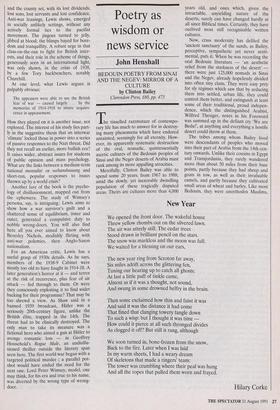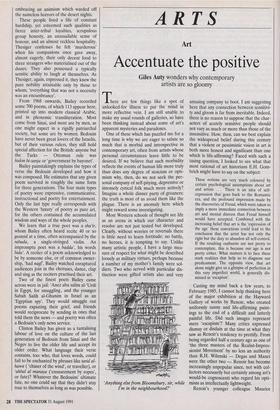Poetry as wisdom or news service
John Henshall
BEDOUIN POETRY FROM SINAI AND THE NEGEV: MIRROR OF A CULTURE by Clinton Bailey Clarendon Press, £60, pp. 473 he tinselled razzmatazz of contempo- rary life has much to answer for in destroy- ing many phenomena which have endured untainted, seemingly for all eternity. How- ever, its apparently systematic destruction of the oral, nomadic, quintessentially ascetic cultures of the Bedouin peoples of Sinai and the Negev deserts of Arabia must rank among its more appalling atrocities.
Mercifully, Clinton Bailey was able to spend some 20 years, from 1967 to 1988, amid the slowly, yet inexorably dwindling population of these tragically disputed areas. Theirs are cultures more than 4,000 years old, and ones which, given the intractable, unyielding nature of the deserts, surely can have changed hardly at all since Biblical times. Certainly, they have outlived most still recognisable written cultures.
Now, crass modernity has defiled the `ancient sanctuary' of the sands, as Bailey, perceptive, sympathetic yet never senti- mental, puts it. When he was recording the oral Bedouin literature — 'an aesthetic relief from the starkness of the desert' — there were just 125,000 nomads in Sinai and the Negev, already hopelessly divided into often tiny clans. They were easy prey for sly regimes which saw that by seducing them into settled, urban life, they could control them better, and extinguish at least some of their traditional, proud indepen- dence, which the distinguished Arabist, Wilfred Thesiger, notes in his Foreword was summed up in the defiant cry 'We are Bedu!', at anything and everything a hostile desert could throw at them.
The tribes among whom Bailey lived were descendants of peoples who moved into their part of Arabia from the 14th cen- tury onwards. Unlike their cousins in Egypt and Transjordania, they rarely wandered more than about 50 miles from their base points, partly because they had sheep and goats in tow, as well as their invaluable camels, and partly because they cultivated small areas of wheat and barley. Like most Bedouin, they were unorthodox Muslims,
embracing an animism which warded off the nameless horrors of the desert nights.
These people lived a life of constant hardship, yet esteemed such qualities as fierce inter-tribal loyalties, scrupulous group honesty, an unassailable sense of honour, and an almost reckless hospitality. Thesiger confesses he felt 'murderous' when his companions once gave away, almost eagerly, their only decent food to three strangers who materialised out of the dunes. They also possessed a typically semitic ability to laugh at themselves. As Thesiger, again, expressed it, they knew the pure nobility attainable only by those to whom, 'everything that was not a necessity was an encumbrance'.
From 1968 onwards, Bailey recorded some 700 poems, of which 113 appear here, printed up into modern classical Arabic, and in phonemic transliteration. Most come from Sinai, and most are by men, as one might expect in a rigidly patriarchal society, but some are by women. Bedouin have never been great lovers of the Israelis, but of their various rulers, they still hold special affection for the British: anyone but the Turks — Ottoman rule was hukm bi-sanja or 'government by bayonet'.
Bailey painstakingly explains the types of verse the Bedouin developed and how it was composed. He estimates that any given poem survived in roughly the same form for three generations. The four main types of poetry were expressive, communicative, instructional and poetry for entertainment. Only the last type really corresponds with the Western 'luxury' of poetry as pure art, for the others contained the accumulated wisdom and ways of the whole peoples.
We learn that a true poet was a sha`ir, whom Bailey often heard recite 40 or so gasayid at a time, often accompanied by the rabada, a single-stringed violin. An impromptu poet was a badda', his words bida`. A reciter of a poem acknowledged to be by someone else, or of common owner- ship, 'had nag!'. Bailey watched enraptured audiences join in the choruses, dance, clap and sing as the reciters practised their art.
Two of the finest poets Bailey came across were in jail: `Anez abu salim aPUrdi in Egypt, for smuggling, and the younger Sabah Salih al-Ghanim in Israel as an `Egyptian spy'. They would smuggle out poems expiating their grief, and friends would reciprocate by sending in ones that told them the news — and poetry was often a Bedouin's only news service.
Clinton Bailey has given us a tantalising labour of love on the culture of the last generation of Bedouin from Sinai and the Negev to live the older life and accept its older order. What language their verse contains, too: who, that loves words, could fail to be enchanted by phrases like tarid a!- hawa ( 'chaser of the wind', or traveller), or `ahbal a! manaya (`ensnarement by ropes', or fate)? Whatever the Bedouins' ultimate fate, no one could say that they didn't stay true to themselves as long as was possible.











































 Previous page
Previous page